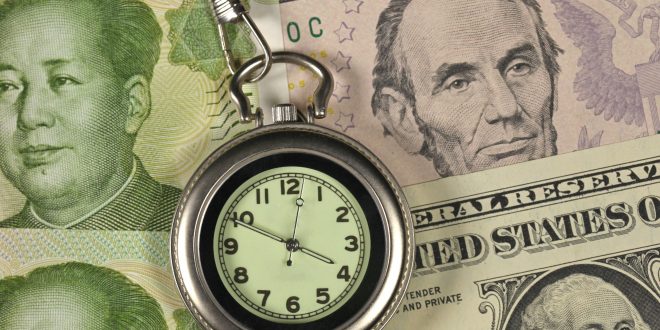It’s been an eventful week, from Powell’s testimony, BoE decision, inflation data, and PMI. Here’s a look at the highlights of the past week.
Dollar
Since the opening of the US session on Friday, the dollar has struggled to maintain the bullish trend after the emergence of the second consecutive batch of positive US data, which highlighted an improvement in personal income and a rise below market expectations in US consumers price inflation.
The dollar index, which measures the US currency’s strength against a basket of major currencies, rose to 91.84 points against the closing recorded at the end of last Thursday’s trading day at 91.81.
The index fell to its lowest level during Friday’s trading at 91.86 points, compared to the lowest levels in the same period at 91.53 points.
Europe
European shares remained close to all-time highs on Friday, supported by the financial and raw materials sector, while Credit Suisse shares rose after a Reuters report studying a possible merger with UBS.
Shares of the scandal-hit Swiss bank rose 1.9%, as the report said the Credit Suisse management was under pressure to come up with a comprehensive reform plan. UBS shares rose 0.2 percent.
The pan-European STOXX 600 index rose 0.1%, ending the week up 1%, after fluctuating sharply on fears of high inflation affecting real income and prompting central banks to raise interest rates sooner than expected.
The Stoxx 600 fell sharply from all-time highs last week after a surprisingly hawkish tone from Federal Reserve officials turbulent global financial markets.
Oil
Oil prices rose today, Friday, to their highest levels since October 2018, making both benchmarks record a fifth consecutive week, supported by expectations that demand growth will outpace supplies and that OPEC+ producers will be cautious in returning more production to the market from August.
Brent crude futures rose 62 cents, or 0.8%, to settle at $76.18 a barrel. US West Texas Intermediate crude rose 75 cents, or 1 percent, to $74.05 a barrel.
These are the highest closing levels for the two benchmarks since October 2018, and make them up more than 3 percent on a weekly basis.
Bitcoin
Bitcoin fell about 7.00% on Friday after rising past $35,000 last Thursday on the back of China’s actions against cryptocurrency mining.
Bitcoin fell to 32,398 levels against the previous day’s close of 34,649; the most popular cryptocurrency climbed to a high of 35,517 vs. 31,500.
Gold
Gold prices fell as they came under pressure due to the stability of the dollar, while investors sought to pass mixed signals from the US Federal Reserve regarding an increase in interest rates and are awaiting more economic data in the United States to gauge the extent of inflationary pressures.
The dollar index settled higher, near an 11-month high, against its rivals on Friday.
BoE
The Bank of England’s (BoE) Monetary Policy Committee (MPC) decided to leave the benchmark interest rate unchanged at 0.10% following the June policy meeting and kept the Asset Purchase Facility steady at £895 billion as widely expected.
Powell’s testimony
US Federal Reserve Chairman Jerome Powell said in a written testimony he gave at a congressional hearing on Tuesday, June 22, that the US economy reflects “continuous improvement” as it recovers from coronavirus pandemic.
He also explained that the labor market and jobs are still making gains. Regarding inflation, Powell said that it had “remarkably increased in the past few months.”
In another context, Powell stressed that the Fed would not raise interest rates quickly, based solely on inflation concerns.
Calendar
As measured by the Personal Consumption Expenditures (PCE) Price Index, inflation in the US was 0.4% in May, the US Bureau of Economic Analysis reported on Friday. On a yearly basis, the PCE Price Index edged higher to 3.9% from 3.6% than analysts’ estimate of 4%.
The IHS Markit’s Manufacturing PMI for the US rose to 62.6 (preliminary) in June from 62.1 in May and notched a new series high. This reading came in better than the market expectation of 61.4 and showed that the business activity in the manufacturing sector continued to expand at an unprecedented pace.
More importantly, the annual Core PCE Price Index, the Federal Reserve’s preferred gauge of inflation, rose to 3.4% in May, matching the market consensus.
The German manufacturing sector unexpectedly quickened its pace of expansion in June, the preliminary manufacturing activity report from IHS/Markit research showed this Wednesday.
In Eurozone’s no.1 economy, the Manufacturing PMI stood at 64.9 this month vs. 63.0 expected and 64.4 prior. The index jumped to two-month lows.
The Eurozone manufacturing sector activity boosted its pace of expansion in the reported month, the latest manufacturing activity survey from IHS/Markit research showed on Wednesday.
The Eurozone Manufacturing purchasing managers index (PMI) remained steady at 63.1 in June and beat 62.1 expectations.
The seasonally adjusted IHS Markit/CIPS UK Manufacturing Purchasing Managers’ Index (PMI) eased to 64.2 in June versus 64.0 expected and 65.6 – May’s final reading.
Retail Sales in Canada fell by 5.7% on a monthly basis in April, the data published by Statistics Canada showed on Wednesday. This reading followed March’s increase of 3.6% and came in worse than the market expectation for a contraction of 5%.
Coronavirus
Official data showed that the United Kingdom recorded 18,270 new cases of Coronavirus today, Saturday, in the most significant daily number of infections since the fifth of February, in addition to recording 23 deaths.
Daily infections have been increasing in Britain for a month. Still, the rapid vaccination program appears to have essentially broken the link between infection and mortality, with daily deaths remaining within 20 or less.
On Friday, Britain announced 15,810 new cases.
The data also showed that 83.7% of adults received the first dose of the vaccine, and 61.2% received both doses.
Australia’s COVID-19 response committee is holding an emergency meeting on Monday, as the outbreak of the highly contagious delta strain across the country led to the closure of Sydney and the renewal of restrictions in other regions.
About 18 million Australians, or about 70 percent of the population, are now under some form of general isolation or restrictions linked to Covid-19, as officials grapple with outbreaks in almost all states and territories.
 Noor Trends News, Technical Analysis, Educational Tools and Recommendations
Noor Trends News, Technical Analysis, Educational Tools and Recommendations





